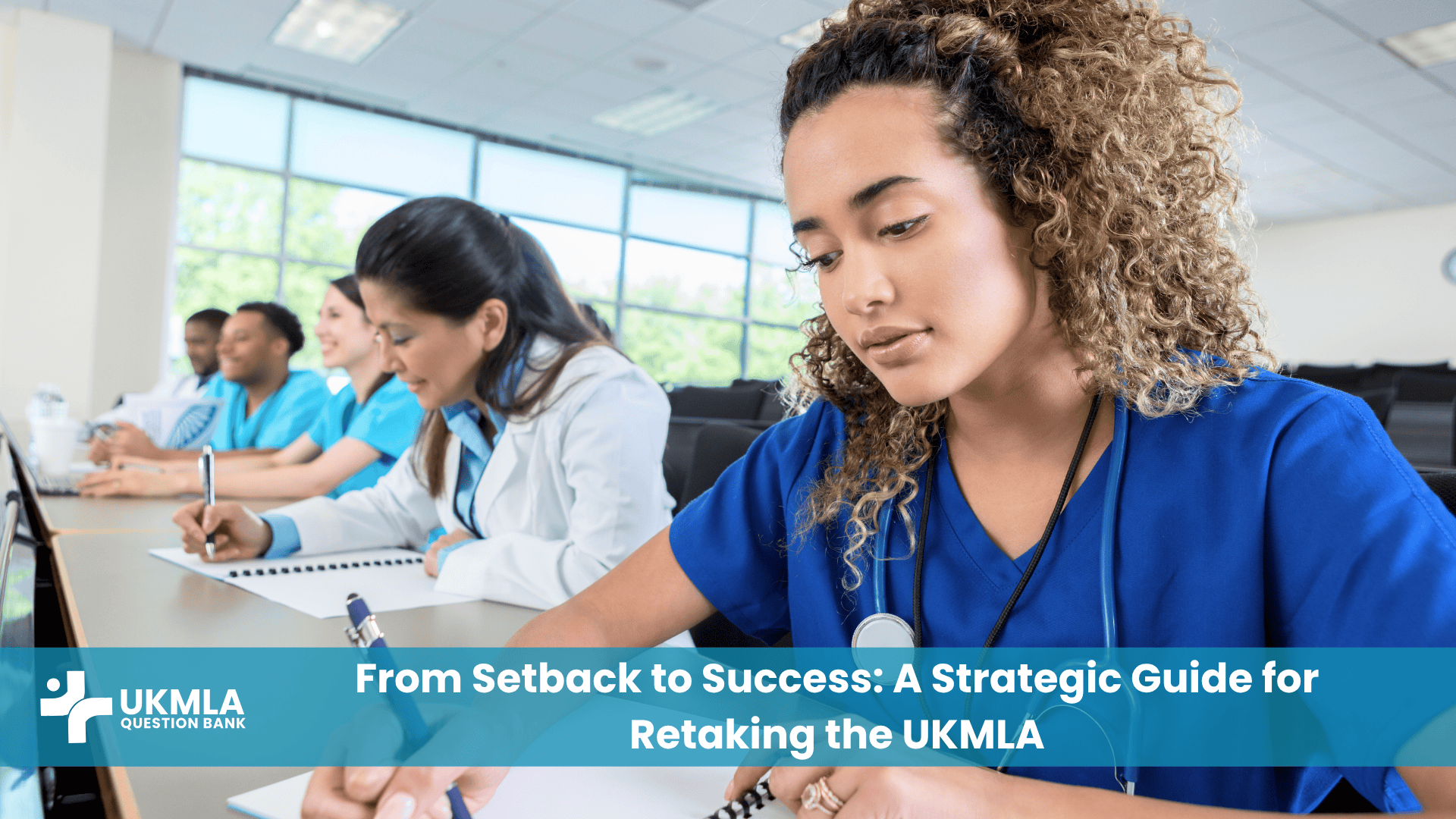Introduction
Facing the challenge of retaking the UKMLA can feel disheartening, and it’s essential to first acknowledge that this is a difficult and stressful situation. The path to becoming a doctor is filled with high-stakes assessments, and a setback is not a reflection of your potential as a future clinician. It is, however, a critical juncture that demands a new, more strategic approach. Viewing this as an opportunity to refine your methods and deepen your understanding is the first step toward a much higher score.
This guide is designed to be your comprehensive roadmap for that journey. We will move beyond simply “studying harder” and focus on a structured, five-step plan to help you process the result, conduct a forensic analysis of your last attempt, build a smarter study plan, and prioritize your well-being. This is your chance to turn a setback into a setup for a major comeback, armed with a better strategy and a more resilient mindset.
Table of Contents
ToggleStep 1: Processing the Setback & Building a Resilient Mindset
Before you can build a new study plan, you must first build a new psychological foundation. Your mindset will be the single most important factor in your success this time around.
Acknowledging Your Feelings Without Judgment
It is completely normal to feel disappointed, frustrated, angry, or even ashamed. These are valid emotional responses to a significant setback. The most counterproductive thing you can do is to suppress these feelings or criticize yourself for having them. Instead, give yourself a specific, limited amount of time—a few days, perhaps—to process these emotions. Talk to trusted friends or family, engage in hobbies you enjoy, and allow yourself to grieve the result. This period of emotional processing is not a waste of time; it’s a necessary step to clear your head and prepare for the logical, strategic work that lies ahead.
Shifting from a “Failure” Mindset to a “Growth” Mindset
Once you’ve processed the initial emotion, you must consciously reframe the situation. A “fixed mindset” views this result as a permanent label on your ability. A “growth mindset,” a concept from psychologist Carol Dweck, sees it as a temporary state based on your previous strategy—a strategy that can be analyzed and improved. This is not a judgment of your intelligence; it is feedback on your method. Embracing this perspective is crucial. You did not fail; your strategy did. And strategies can be fixed. This new mindset is a core part of achieving UKMLA success.
Step 2: The Deep Dive – A Forensic Analysis of Your Last Attempt
The most common mistake candidates make when retaking an exam is to simply repeat the same study methods, just with more intensity. The goal this time is not to study harder, but to study smarter. That begins with a deep, honest analysis of what went wrong.
Gathering and Understanding Your Performance Feedback
The GMC provides feedback on your performance, highlighting the areas where you underperformed. This document is not a critique; it is your treasure map. It tells you exactly where to focus your efforts. Go through it carefully and categorize the feedback. Were your weak areas specific clinical specialties (e.g., Paediatrics, Obstetrics), or were they skill-based domains (e.g., data interpretation, diagnosis, professionalism)? A thorough process of analysing UKMLA performance is the first practical step.
Identifying Your Weak Areas: Knowledge Gaps vs. Technique Errors
This is the most critical part of your analysis. For every weak area, you must determine the root cause of the errors. Go through as many questions as you can remember from the exam or from your mock exams leading up to it.
Key Question: “Did I get this question wrong because I didn’t know the information (a knowledge gap), or because I misunderstood the question, ran out of time, or fell for a distractor (a technique error)?”
Create a detailed log to track this. This will fundamentally change how you prepare. Knowledge gaps require focused content revision, while technique errors require a different style of practice, focusing on question interpretation and time management.
Table 1: Self-Analysis Log for UKMLA Retake
| Topic / Question Area | Mistake Type (Knowledge or Technique?) | Specific Reason & Actionable Step |
| Cardiology Q23 | Knowledge | Did not know the ECG criteria for Wellens’ syndrome. Revise ACS ECGs. |
| Respiratory Q45 | Technique | Misread “least likely” as “most likely”. Action: Slow down, highlight keywords in the stem. |
| Paediatrics Q12 | Technique | Ran out of time on this question. Action: Practice more timed question blocks. |
| Endocrinology Q31 | Knowledge | Confused Addison’s and Cushing’s labs. Action: Create a comparison table using Anki. |
| Ethics Scenario | Technique | Didn’t structure my answer around the 4 pillars. Action: Practice verbalizing the ethics framework. |
Step 3: Creating a New, Smarter Study Plan
With a clear diagnosis of your weak areas, you can now build a targeted and effective study plan.
Quality Over Quantity: Focusing on Active Recall and Spaced Repetition
Passive learning—reading notes, watching videos—is comfortable but notoriously inefficient for long-term retention. Your new plan must be built on the foundations of active recall and spaced repetition.
Active Recall: This means actively retrieving information from your brain, which strengthens neural pathways. Instead of re-reading a chapter on diabetic ketoacidosis, close the book and write down everything you can remember about it (the “blurting” method). Explain the concept out loud to an empty room as if you were teaching it (the Feynman technique). This struggle to recall is the very process that builds strong memories.
Spaced Repetition: This is the principle of reviewing information at increasing intervals. A concept you learn today should be reviewed tomorrow, then in three days, then in a week, and so on. This is far more effective than cramming. Use a tool like Anki to create digital flashcards for key facts, drug doses, or diagnostic criteria.
The Crucial Role of High-Quality Question Banks
A high-quality question bank is your single most important tool. It is not just for testing yourself; it is your primary learning resource. The process should be a continuous cycle:
Do a block of questions, timed.
Review every single question, including the ones you got right (to ensure it wasn’t a lucky guess).
Read the explanations meticulously to understand the core concept being tested and why the other options were incorrect.
Make a flashcard or a brief note for any new piece of information you learned. This is how to use a UKMLA question bank effectively, transforming it from an assessment tool into a dynamic learning engine.
Step 4: A Strategic Approach to retaking the ukmla
This attempt is about more than just knowledge; it’s about strategy and execution on exam day.
Simulating Exam Conditions with Timed Mock Exams
You must complete several full-length mock exams in the weeks leading up to your test. This builds mental stamina and perfects your pacing. A full mock should replicate the exam day as closely as possible: start at the same time, take scheduled breaks, wear the clothes you plan to wear, and adhere strictly to the time limits for each section. This process desensitizes you to the pressure of the real exam, reveals any remaining issues with your time management, and ensures there are no surprises on the day.
Mastering Time Management and Question Interpretation Skills
Technique errors are often what separate a pass from a fail. When reviewing practice questions, focus on how the question is asked.
Identify Keywords: Actively highlight or underline crucial words in the question stem: “initially,” “definitive,” “most appropriate,” “least likely.”
Spot the Distractors: For every question, analyze the incorrect options. Why are they wrong? What piece of information makes them plausible but ultimately incorrect? Understanding the distractors is as important as knowing the right answer.
Manage Your Time: If a question is too difficult, make an educated guess, flag it, and move on. Do not let one difficult question derail you and prevent you from answering several easier questions later on. One of the most common UKMLA mistakes to avoid is poor time management.
Step 5: Prioritizing Your Well-being for Peak Performance
You cannot perform at your cognitive peak if you are exhausted and burned out. This is even more important during a retake, as the emotional stakes are higher.
Strategies to Avoid Burnout the Second Time Around
Your study plan must include scheduled, guilt-free breaks. This includes short breaks every hour and at least one full day off per week where you do not engage with any medical content. Protect your sleep—aim for 7-8 hours per night, as this is when memory consolidation occurs. Maintain a healthy diet rich in brain-fuelling foods and incorporate regular physical activity into your routine. These are not luxuries; they are essential, evidence-based components of an effective study plan.
Building and Leveraging a Strong Support System
Do not isolate yourself during this period. Be honest with your family and friends about the challenge you’re facing and what you need from them. Connect with peers who are also retaking the exam if possible; they are the only ones who truly understand what you’re going through. And remember, if the stress becomes overwhelming, seeking support is a sign of strength. The NHS provides excellent resources on dealing with exam stress that can be very helpful.
Resilience Quote: “Our greatest glory is not in never falling, but in rising every time we fall.” – Confucius
Frequently Asked Questions (FAQ) about Retaking the UKMLA
The regulations regarding the number of attempts and the timeframes for retakes are set by the GMC. This can change, so it is absolutely essential to check the GMC’s official guidance directly for the most up-to-date and accurate information.
The UKMLA is a pass/fail competency exam designed to ensure a safe standard for all UK doctors. While a first-time pass is ideal, a successful retake demonstrates resilience, determination, and the ability to learn from feedback—all of which are highly valued qualities in a junior doctor. The most important thing is to pass the exam to demonstrate you meet the required standard.
Be direct, honest, and calm. Frame it as a setback, not a final failure. It’s helpful to say something like, “I received my UKMLA result, and unfortunately, I didn’t pass this time. I’m disappointed, but I have a clear plan to retake it and succeed.” Let them know how they can best support you.
This is a very common feeling. The key is to start with very small, achievable goals. The goal for tomorrow is not “pass the UKMLA,” but “complete one block of 10 questions and review them thoroughly.” This is a “win.” Accumulating these small, daily wins will slowly and steadily rebuild your confidence based on tangible evidence of your hard work.
Not necessarily. The problem is usually not the resource itself, but how it was used. A question bank used passively is a poor resource; the same question bank used for active learning and analysis is an excellent one. However, if you genuinely found a particular resource confusing or incomplete, now is the time to replace it.
This is highly personal and depends on your analysis in Step 2. You need enough time to conduct a thorough review, create a new plan, address your specific weak areas without rushing, and complete several mock exams. It’s far better to take a little more time and be fully prepared than to rush into a second attempt with the same underlying issues.
Your self-analysis log (Table 1) is your best defence against this. By actively identifying, categorizing, and writing down your mistakes, you are forcing yourself to confront them. For technique errors, you must consciously practice the correct method until it becomes second nature. For example, force yourself to physically highlight keywords in every question stem for a week.
A tutor can be very effective, especially if you have identified specific, persistent knowledge gaps or technique issues. A good tutor can provide personalized feedback, a new perspective on your preparation, and accountability, which can be invaluable during a retake.
Focus on the process, not the outcome. Your goal each day is to execute your study plan, not to worry about the result. Mindfulness and breathing exercises can also be very effective at managing anxiety when it arises. When the fear surfaces, acknowledge it, and then gently redirect your focus back to the task at hand.
The biggest difference is strategy. Successful candidates don’t just work harder; they work smarter. They conduct an honest and brutal self-assessment, are willing to abandon old habits that didn’t work, and focus relentlessly on fixing the root causes of their previous mistakes, whether they were in knowledge, technique, or mindset.
Conclusion
Facing the prospect of retaking the UKMLA is a formidable challenge, but it is one you can absolutely overcome with the right strategy and mindset. It is a test of character as much as it is a test of knowledge. The key is to abandon your old methods and embrace a new, more analytical approach. See this not as a repeat of your first attempt, but as an entirely new project, informed by the valuable data you gained from your experience.
Trust in the process of deep analysis, active learning, and consistent practice. Prioritize your well-being and build a resilient mindset that can withstand the pressures of this journey. By doing so, you will transform this setback into a powerful story of perseverance and success, making you not only a doctor who meets the standard, but a more resilient and self-aware clinician for it.




